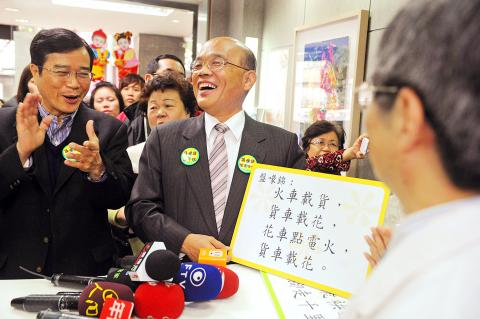Family education is the most significant factor in promoting and preserving mother languages in Taiwan, Democratic Progressive Party (DPP) Chairman Su Tseng-chang (蘇貞昌) said yesterday on International Mother Language Day.
“It is regrettable that some parents have not tried to teach their children how to speak their mother language,” Su said at a press conference organized by the Taiwan Mother Tongue Alliance to promote native languages, including Hoklo (also known as Taiwanese), Hakka and other Aboriginal languages.
The alliance launched an annual event two years ago in which consumers who speak native languages at select businesses receive a discount. More than 100 clinics, restaurants and stores across the country are supporting the campaign this year.

Photo: CNA
People cannot abandon their mother tongue, which is the root of any culture, Su said. The respect of mother languages is the respect for the cultures of all ethnic groups.
The government’s policy on mother language and culture is crucial in preserving native languages as well, Su said, citing the example of the Japanization movement initiated by the government during the Japanese colonial period and the Chinese Nationalist Party (KMT) government’s banning of native languages after it fled to Taiwan in 1949.
“Mother languages will not be preserved unless the nation’s leader has the right attitude toward linguistic heritage and true respect for cultural diversity,” Su said.
Chinese was the only language used on public address systems for a long time until the Taiwan Provincial Assembly demanded the government add Hoklo and Hakka to the service when Su served as a provincial councilor in the 1980s, he said.
The event, which runs from yesterday to Monday, aims to encourage people to speak native languages and pass on diverse cultures, as well as to promote equal status for all languages in Taiwan, alliance chairman Li Khin-huann (李勤岸) said.

A strong continental cold air mass is to bring pollutants to Taiwan from tomorrow, the Ministry of Environment said today, as it issued an “orange” air quality alert for most of the country. All of Taiwan except for Hualien and Taitung counties is to be under an “orange” air quality alert tomorrow, indicating air quality that is unhealthy for sensitive groups. In China, areas from Shandong to Shanghai have been enveloped in haze since Saturday, the ministry said in a news release. Yesterday, hourly concentrations of PM2.5 in these areas ranged from 65 to 160 micrograms per cubic meter (mg/m³), and pollutants were

Taiwan’s armed forces have established response protocols for a wide range of sudden contingencies, including the “Wan Chun Plan” to protect the head of state, the Ministry of Defense (MND) said today. After US President Donald Trump on Saturday launched a series of airstrikes in Venezuela and kidnapped Venezuelan President Nicolas Maduro, concerns have been raised as to whether China would launch a similar “decapitation strike” on Taiwan. The armed forces regularly coordinate with relevant agencies and practice drills to ensure preparedness for a wide range of scenarios, Vice Minister of National Defense Hsu Szu-chien (徐斯儉) told reporters before a

EVA Airways on Saturday said that it had suspended a pilot and opened an investigation after he allegedly lost his temper and punched the first officer several times as their plane was taxiing before takeoff at Los Angeles International Airport. According to a report published on Thursday by The Reporter, the incident occurred after the flight’s Malaysian first officer tried to warn the Taiwanese pilot, surnamed Wen (文), that he was taxiing faster than the speed limit of 30 knots (55.6kph). After alerting the pilot several times without response, the first officer manually applied the brakes in accordance with standard operating

Japanese Councilor Hei Seki (石平) on Wednesday said that he plans to visit Taiwan, saying that would “prove that Taiwan is an independent country and does not belong to China.” Seki, a member of the Japan Innovation Party, was born in Chengdu in China’s Sichuan Province and became a naturalized Japanese in 2007. He was elected to the House of Concilors last year. His views on the Chinese Communist Party (CCP) — espoused in a series of books on politics and history — prompted Beijing to sanction him, including barring Seki from traveling to China. Seki wrote on X that he intends